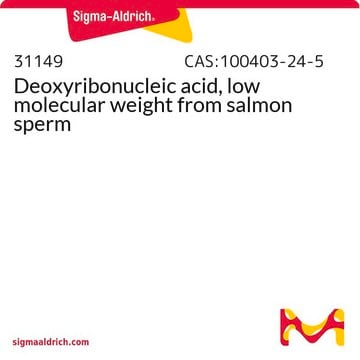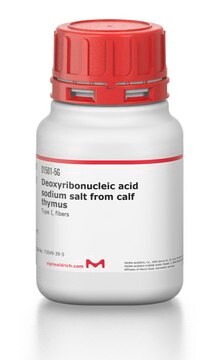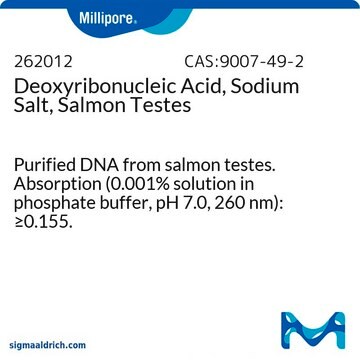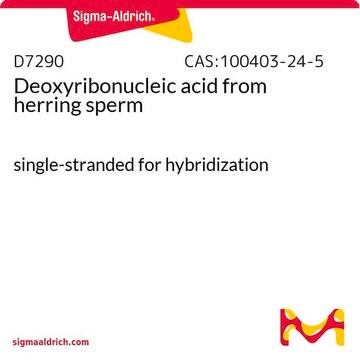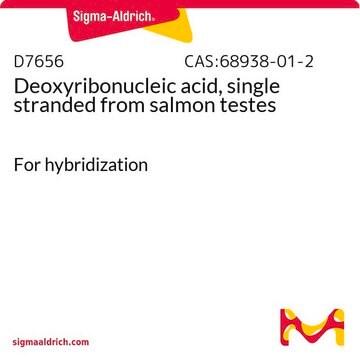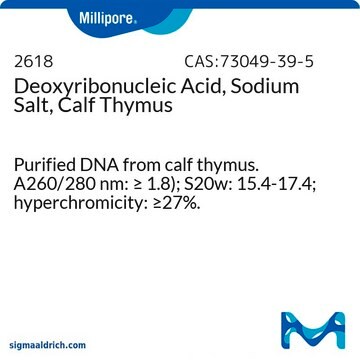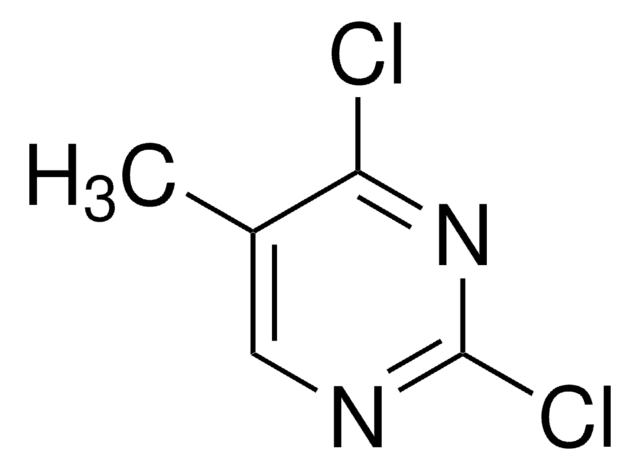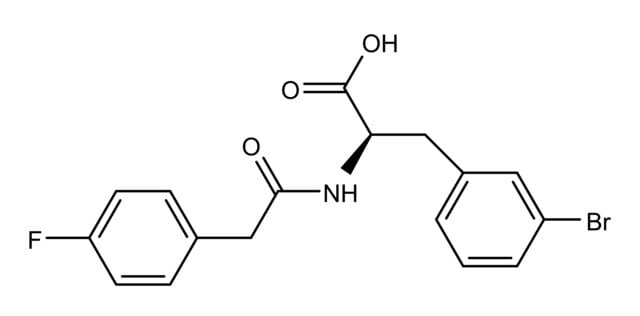D1626
Deoxyribonucleic acid sodium salt from salmon testes
Synonym(s):
SS-DNA, smDNA, DNA
Sign Into View Organizational & Contract Pricing
All Photos(5)
About This Item
Recommended Products
Looking for similar products? Visit Product Comparison Guide
Application
Deoxyribonucleic acid sodium salt has been used in a study to evaluate the cytotoxicity of enzyme inhibitors and absorption enhancers in Caco-2 cells for oral delivery of salmon calcitonin. Deoxyribonucleic acid sodium salt has also been used in a study to develop a simple method for extracting DNA from Cryptosporidium oocysts.
Deoxyribonucleic acid sodium salt from salmon testes has been used in basal medium for the anaerobic growth of several Bacillus mojavensis strains It has been also used as a component of immunoprecipitation (IP) buffer for the Microplate-Based Matrix Chromatin Immunoprecipitation (ChIP).
Deoxyribonucleic acid sodium salt from salmon testes has been used in basal medium for the anaerobic growth of several Bacillus mojavensis strains It has been also used as a component of immunoprecipitation (IP) buffer for the Microplate-Based Matrix Chromatin Immunoprecipitation (ChIP).
Salmon Sperm Deoxyribonucleic acid (SS-DNA) may be used to study physicochemical interactions of DNA with binding agents, intercalation agents, modification agents, detection agents and compaction agents. Salmon sperm DNA is used to study the loading capacity of magnetic mesoporous silica nanoparticles (M-MSNs) and binding capacities of polymer nanolayer architectures. SS-DNA may be used as substrate for development of DNA detection assays.
Linkage
Formerly listed as Type III
related product
Product No.
Description
Pricing
Storage Class Code
11 - Combustible Solids
WGK
WGK 3
Flash Point(F)
Not applicable
Flash Point(C)
Not applicable
Personal Protective Equipment
dust mask type N95 (US), Eyeshields, Gloves
Certificates of Analysis (COA)
Search for Certificates of Analysis (COA) by entering the products Lot/Batch Number. Lot and Batch Numbers can be found on a product’s label following the words ‘Lot’ or ‘Batch’.
Already Own This Product?
Find documentation for the products that you have recently purchased in the Document Library.
Customers Also Viewed
Sandra L McLellan et al.
Elementa (Washington, D.C.), 6 (2018-11-06)
Despite modern sewer system infrastructure, the release of sewage from deteriorating pipes and sewer overflows is a major water pollution problem in US cities, particularly in coastal watersheds that are highly developed with large human populations. We quantified fecal pollution
Thet Tun Aung et al.
The ocular surface, 15(4), 770-783 (2017-07-01)
The potential of slow-growing mycobacteria to form biofilms in human tissues contributes to the problem of establishing an effective treatment strategy. The purpose of this study was to examine new antibiotic strategies to enhance current treatment options for these infections.
Marie-Louise Ainalem et al.
Langmuir : the ACS journal of surfaces and colloids, 26(7), 4965-4976 (2009-12-05)
This study shows that DNA (linearized plasmid, 4331 base pairs and salmon sperm, 2000 base pairs, respectively) adsorbs to model membranes of zwitterionic liquid crystalline phospholipid bilayers in solutions containing divalent Ca(2+) cations, and also in solutions containing monovalent Na(+).
Paul Cernak et al.
mBio, 9(5) (2018-09-27)
Throughout history, the yeast Saccharomyces cerevisiae has played a central role in human society due to its use in food production and more recently as a major industrial and model microorganism, because of the many genetic and genomic tools available
Jixi Zhang et al.
Journal of colloid and interface science, 361(1), 16-24 (2011-06-22)
Magnetic mesoporous silica nanoparticles (M-MSNs) are emerging as one of the most appealing candidates for theranostic carriers. Herein, a simple synthesis method of M-MSNs with a single Fe(3)O(4) nanocrystal core and a mesoporous shell with radially aligned pores was elaborated
Our team of scientists has experience in all areas of research including Life Science, Material Science, Chemical Synthesis, Chromatography, Analytical and many others.
Contact Technical Service
